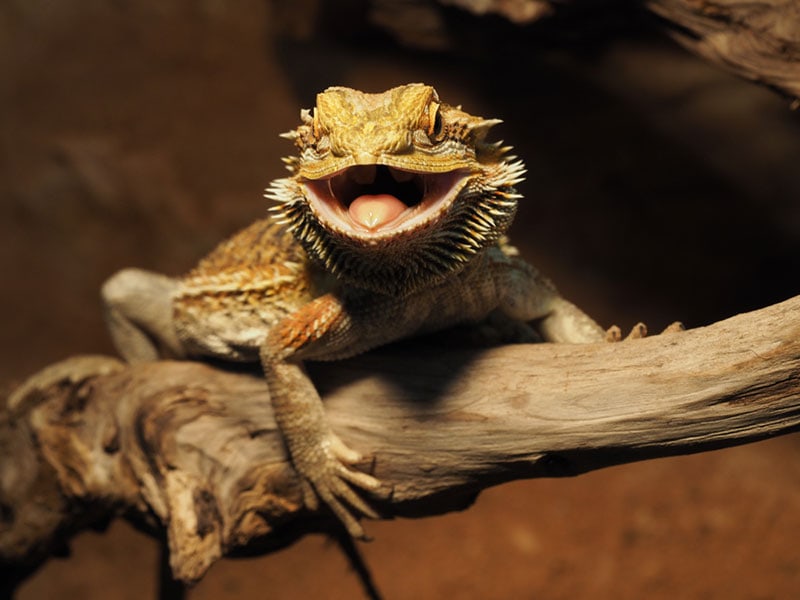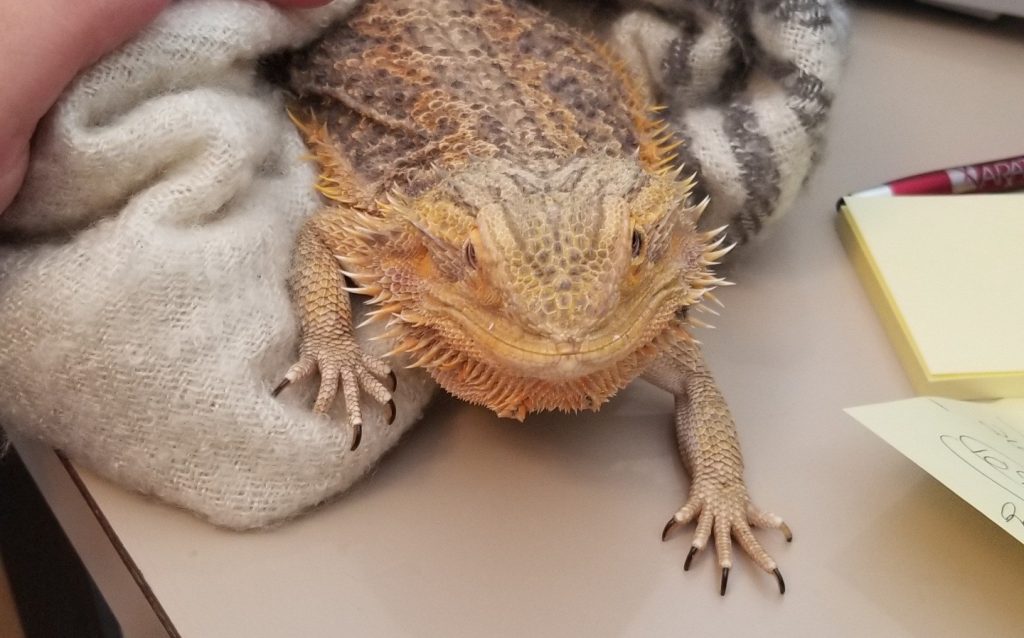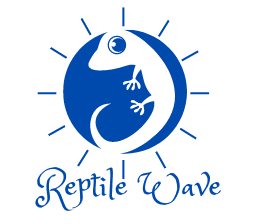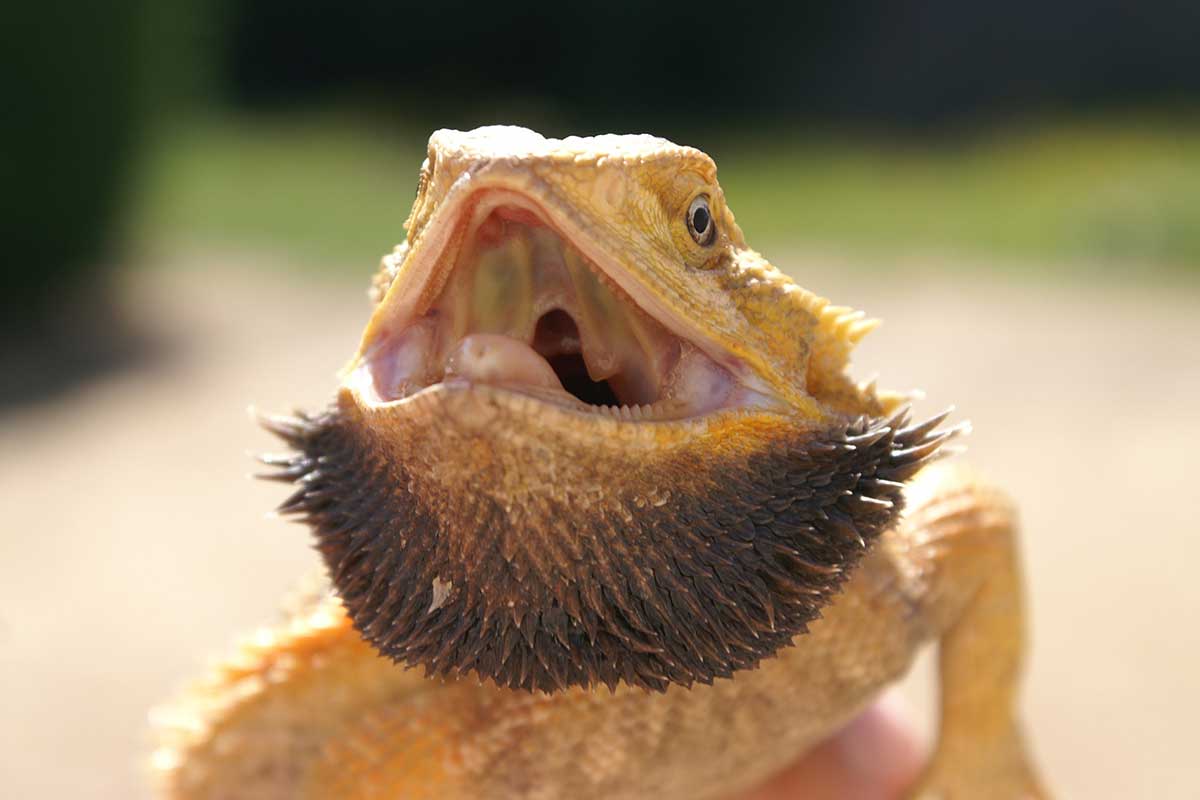Bearded dragons typically open their mouths after eating, which can occur for a variety of reasons. They could be adjusting their body temperature, helping digestion, or simply relaxing out. This allows them to calm down after eating and improves their breathing. Some dragons may also use it to stretch and relax their mouth muscles.
However, if they do it frequently or appear disturbed, it may indicate they are not feeling well. Health issues such as respiratory infections, difficulty digesting their bedding, or heat stress could be the culprit.
Keep a watch out for additional indicators, like excessive tiredness, changes in how much they eat, or unusual poop, to ensure their well-being.
Why Do Bearded Dragons Open Their Mouths After Eating?
Bearded dragons open their mouths after eating for a few important reasons, and it’s a normal and healthy behavior. Let’s find out why:
Staying Just Right
Bearded dragons need the right temperature to feel good. They use something called “thermoregulation” to do this. In simple words, they rely on the sun or a warm spot in their home to stay warm.
Cooling down or warming up
Opening their mouths (called “gaping”) helps bearded dragons control their body temperature. If it’s too hot, it cools them down, and if it’s too cold, it warms them up. They also do this after eating because digesting food makes them warm, and opening their mouths helps them cool down a bit.
Breathing Troubles
Sometimes, bearded dragons may have trouble breathing, which can make them feel unwell. When this happens, they might keep their mouths open to get more air, like taking big breaths.
Not Feeling Well Signs
If a bearded dragon keeps opening its mouth a lot, especially when it’s not after eating, it could mean something is wrong. Breathing problems might be caused by infections, stress, or not enough humidity in their home.
So, if you see your bearded dragon opening its mouth, don’t worry too much! It’s just their way of staying comfortable and healthy.
What Are Worrying Signs of a Bearded Dragon’s Mouth Being Open?

Bearded dragon owners should be attentive to these signs and seek veterinary advice if abnormalities persist.
Normal Open Mouth Behavior
- Happens occasionally, like after eating or during basking.
- Lasts for a short time; the dragon closes its mouth quickly.
- Usually occurs after feeding or during basking for temperature control.
- No or minimal accompanying signs; the dragon looks healthy and active.
- Consistent with expected behavior patterns.
- Possible causes include thermoregulation and post-feeding activities.
- No immediate concern; monitor for changes.
Problematic Open Mouth Behavior
- Happens frequently, outside of typical situations.
- Lasts for extended periods, with the dragon gaping.
- Unrelated to temperature regulation or digestion.
- May be accompanied by other abnormal behaviors or signs of distress.
- Inconsistent with normal behavior, repetitive over time.
- Possible causes include underlying health issues, respiratory problems, and stress.
Other signs of potential health issues
- Changes in Appetite: A sudden loss or excess hunger may signal health problems. Bearded dragons usually have hearty appetites; any significant change is a concern.
- Weight Loss or Gain: Fluctuations may indicate metabolic issues, parasitic infections, or health concerns. Regularly monitor your bearded dragon’s weight to identify potential problems.
- Unusual Posture or Lethargy: Changes in posture or lethargy can signal discomfort, pain, or systemic issues. Healthy bearded dragons are generally active and alert.
- Abnormal Feces or Urates: Changes in color, consistency, or frequency may indicate digestive issues. Regularly examine excrement to assess digestive health.
- Respiratory Distress: Look out for wheezing, nasal discharge, or audible breathing sounds. These may suggest respiratory infections or pulmonary issues.
- Skin and Eye Abnormalities: Changes in skin color, texture, lesions, or abnormal eye discharge may require attention. These signs could suggest dermatological or ocular problems.
When to Seek Veterinary Assistance for Your Bearded Dragon

If your bearded dragon often keeps its mouth open, it might mean it’s not feeling well. It could be having trouble breathing or other problems. Take your dragon to the vet to find out what’s wrong and how to help. Watch for signs like tiredness, weight loss, a runny nose, or changes in pooping, and tell the vet about them.
To keep your dragon healthy and happy, visit the vet regularly, even if it seems okay. The vet can check if everything is fine and give you tips on how to take care of your dragon’s home, what to feed it, and keep it in great shape. Taking care of these things will ensure your bearded dragon lives a healthy and happy life!
FAQs
We’re here to help answer common queries and provide information about bearded dragons.
Beardies typically eat 1-2 times daily, with frequency varying based on age and health.
After eating, bearded dragons may bask for digestion or seek a comfortable spot to rest.
Bearded dragons can go without eating for 24-48 hours; consult a vet if it persists.
Beardies eat based on size; juveniles eat more frequently, while adults may eat every 1-2 days.
Offer water regularly; signs of thirst include frequent licking and staying close to water sources.
Final Words
It’s important to watch out for our bearded dragon pals. We need to understand how they eat and act after munching on their meals. If they’re opening their mouths a lot, we should figure out if it’s just a way for them to feel comfy or if something might be wrong, like with their breathing.
However, if we notice any odd changes, like them not wanting to eat or acting differently, we should pay attention. To keep them super happy and healthy, we should make sure their homes have the right temperatures, feed them good food, and take them to the vet regularly.

